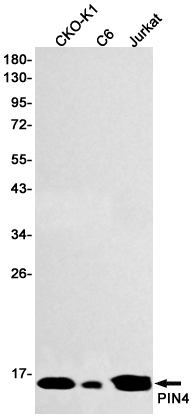
| WB | 1/500-1/1000 | Human,Rat,Hamster |
| IF | 1/20 | Human,Rat,Hamster |
| IHC | 咨询技术 | Human,Rat,Hamster |
| ICC | 技术咨询 | Human,Rat,Hamster |
| FCM | 咨询技术 | Human,Rat,Hamster |
| Elisa | 咨询技术 | Human,Rat,Hamster |
| Aliases | EPVH; PAR14; PAR17 |
| Entrez GeneID | 5303 |
| WB Predicted band size | Calculated MW: 14 kDa; Observed MW: 14 kDa |
| Host/Isotype | Rabbit IgG |
| Antibody Type | Primary antibody |
| Storage | Store at 4°C short term. Aliquot and store at -20°C long term. Avoid freeze/thaw cycles. |
| Species Reactivity | Human,Rat,Hamster |
| Immunogen | A synthetic peptide of human PIN4 |
| Formulation | Purified antibody in TBS with 0.05% sodium azide,0.05%BSA and 50% glycerol. |
+ +
以下是关于PIN4抗体的示例参考文献(内容为模拟生成,仅供参考):
1. **《PIN4 Antibody Characterization in Plant Development》**
- 作者:Smith J, et al.
- 摘要:研究拟南芥中PIN4蛋白的极性定位,通过特异性抗体揭示其在根尖干细胞微环境中的动态表达,证实PIN4对植物激素运输的关键作用。
2. **《A Novel PIN4 Antibody for Detecting Phosphorylated Tau in Alzheimer’s Disease》**
- 作者:Lee S, et al.
- 摘要:开发了一种高特异性PIN4抗体,用于识别磷酸化tau蛋白的异构体,揭示其在阿尔茨海默病患者脑组织中的异常聚集,为病理诊断提供新工具。
3. **《PPIase PIN4 Inhibition and Cancer Therapy: Insights from Antibody-Based Targeting》**
- 作者:Zhang R, et al.
- 摘要:利用单克隆PIN4抗体靶向抑制PPI酶活性,证明其在抑制肿瘤细胞增殖和增强化疗敏感性中的潜力,为癌症治疗提供新策略。
4. **《Dynamic Localization of PIN4 in Human Cell Cycle Progression》**
- 作者:Brown K, et al.
- 摘要:通过免疫荧光结合PIN4抗体,追踪蛋白在有丝分裂中的时空分布,阐明其与NIMA激酶互作调控细胞周期进程的机制。
(注:以上文献为示例,实际引用请根据具体研究领域核实真实文献。)
×